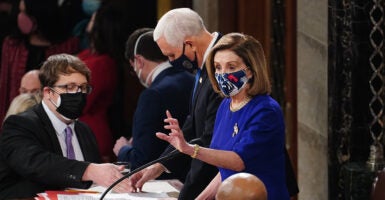While “unprecedented” seemed to be an apt word to describe much of 2020, the beginning of 2021 seems to be continuing the trend by being precedent-breaking in its own right.
In the first weeks of 2021, America witnessed Congress face a series of monumental tests of its commitment to the U.S. Constitution, with the outcome of any one of those tests having the potential to dramatically alter the trajectory of our nation.
The first test was when Vice President Mike Pence was asked to reject the votes of certain states during Congress’ certification of Electoral College votes.
The second test was when the House of Representatives asked the vice president to invoke the 25th Amendment against President Donald Trump to force him from office.
And the third test was when the House took up an unprecedented second impeachment effort against the president.
Any one of these events occurring on its own would be earthshaking. Yet all three happened within the course of just seven days.
In the first, Pence followed the constitutionally correct course of action and refused to send “disputed” electoral votes back to the states.
Although there were legitimate questions raised about unconstitutional changes to state election laws, as well as potential instances of election fraud, our Constitution does not vest the power in one person to declare those election results invalid. Only Congress has the authority to count votes of the Electoral College.
And while some complained about Republican House members and senators raising objections on the floor about the validity of those votes, those members were working within the system, trying to shine a light of transparency on an electoral process that left many doubting the accuracy of the results.
They were attempting to create one last check before the votes were certified to help the American people feel that they had election results they could trust.
In the second event, the House passed a resolution calling on the vice president to invoke the 25th Amendment to forcibly remove Trump from office.
Our Founders designed an electoral process that empowers the American people to choose their leaders through elections. Removing a president outside of that process should be seen only as a last resort.
The House resolution didn’t come close to meeting the constitutional standard for the 25th Amendment, which requires that he be “unable” to carry out his duties. That generally means a physical or mental incapacity, which was not the case.
While some members of Congress felt convinced that the president should go, the end did not justify the means. The Constitution is not to be used as an emotional outlet or as a tool of political retribution.
Again, Pence was right to reject the pressure that was put on him to go down this road. A man of faith, principle, and character, he took an oath to protect and defend the Constitution, and that’s precisely what he did.
The third test of Congress’ commitment to the Constitution came in the impeachment of the president.
The violence and chaos that took place at the U.S. Capitol on Jan. 6 won’t soon be forgotten. But the Democratic majority in the House faced a choice: follow through on its promise to unify the country and focus on the future, or pursue impeachment in an attempt to establish a historical precedent and appease its base.
Our nation needs time to heal from an ugly election, division among our people, and an appalling Capitol riot where lives were lost. That healing not only requires a peaceful transition of power, but efforts by all Americans to reject the rancor in our politics and instead strive to work together for a better future.
The House could have chosen country over party and unity over divisive politics, but it didn’t. While exercising its impeachment powers may be constitutional, the House’s vote to impeach a president with less than a week left in office seemed to be more about using the Constitution as a tool for revenge than using it as the Founders had intended.
In each of these three critical constitutional tests, the decision should never have been about taking one side or the other to support those we favor or to maintain power for a preferred candidate or party. It should have always been—and should always be—first and foremost about siding with the Constitution and, secondly, with the public’s best interest.
Unfortunately, too often during these tests, too many of our leaders failed, and that should weigh heavily on the heart of every American. As tests usually do, they confirmed who in our government we can trust to follow the Constitution and who needs to brush up on the very document they took an oath to uphold.
Originally published by The Washington Times
































